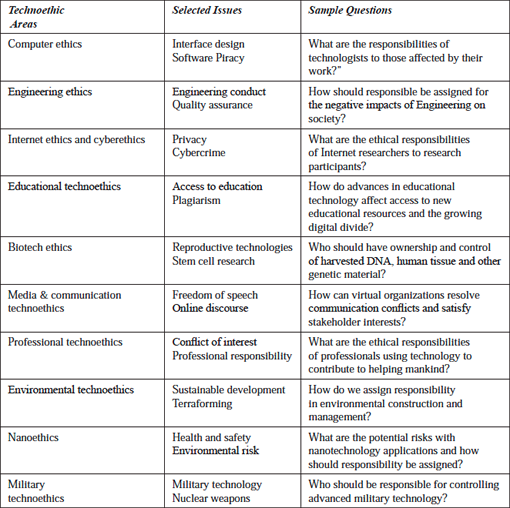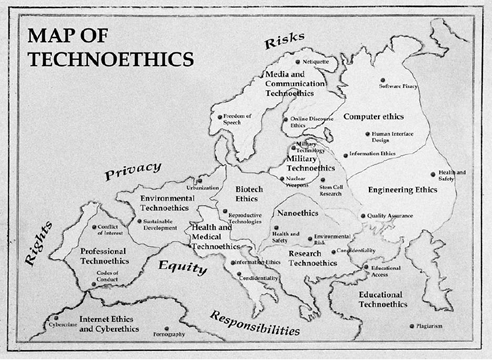Archive for the ‘technology’ tag
Introductions: Technoethics no comments
Moor on Ethics & Technology
Moor (2005) believed that with an increase in the social impact of technological advances, the number of ethical challenges also increase. He suggested that this is a result of the ever-increasing novel uses of technological advances and a lack of ethical inquiry into these activities. For example, the Web has fundamentally altered the social contexts within which we live, work and play. It has raised several questions including some about the legitimacy of human relationships maintained using its platform, its facilitation of illegal activity on a large scale and the privacy of its users.
However, though these are very present and pressing societal issues, they are also vast areas for investigation, and there is relatively sparse research coverage. Also, an added dimension to this challenge is that technological advances seem to continuously change the standard ethical questions. Thereby researchers are forced to simultaneously attempt to explore the ethical implications of these technologies as they were, are now and could be in the future.
Technoethics: Tackling New Types of Ethical Questions
Unsurprisingly, many of the current debates surrounding technological advancement are addressed by technoethics (TE). They are some of the most challenging issues that scientists, innovators and technologists will face. These challenges usually characterise the roles these individuals play when plotting an ambitious route for the future. They inadvertently raise important questions about rights, privacy, responsibility and risk that must be adequately answered.

However, due to the variety of questions resulting in as much ethical inquiries that are based in different fields, there is a tendency for this knowledge to be somewhat disconnected. TE pulls this knowledge together around the central idea of technology. Moreover, unlike traditional applied ethics where focus is placed on an ethical concern for living things, TE is ‘biotechno-centric’. As the Web is to Web science, technology, as well as living things, are central in TE.
The Technoethics Way
Tracing its origins back to the late 1970s, TE emerged as an interdisciplinary field tasked with the job of answering the difficult questions posed earlier. Coined by Mario Bunge (1977), TE does not only assign technical responsibility to technologists but also gives them social and moral responsibility for their technological innovations and applications. It is believed that technologists are responsible for ensuring that their technologies are optimally efficient, not harmful and that its benefits are lasting.
This field distinguishes itself from other branches of applied ethics by elevating technology to the level of living things. However, it also builds on knowledge from wider ethical inquiry as well. TE has many sub-areas, for example, Internet, computer, biotech, cyber and nano ethics.

Calling All Web Scientists
Since the Web’s creation years ago, an understanding of this ever-changing phenomenon and its impact has been developing at a rapid pace in many disciplines. Yet there is a great deal more to learn, especially when the Web is positioned as the subject of focus. Considering Bunge’s views on technoethics, I believe that this obligation rests with Web scientists who are technically, morally and socially responsible for Web innovations and applications.

As a budding Web scientist, thinking about how technoethics applies to Web science, I am absolutely fascinated by all the very interesting questions that could be asked and that I could work towards answering. Ultimately, for us Web scientists, the aims of technoethics could be achieved by gaining insight into the relationship between people, the society and the Web, and how these entities impact each other.
Notes
This & Last Week’s Plan
Identifying the simplest books to read that will give an easy to understand introduction to the disciplines I picked.Making notes on books read.Prepare a blog post that gives an overview of what I want to work on.Publish a blog post that introduces technoethics.- Publish a blog post that introduces risk management.
Outline a reading plan for moving forward.
Introductory Readings
Ethics: A Very Short Introduction– Simon BlackburnHandbook fo Research on Technoethics– Rocci Luppicini & Rebecca AdellRisk: A Very Short Introduction– Baruch FischhoffFundamentals of Risk Management Understanding, Evaluating and Implementing Effective Risk Management– Paul Hopkin
Introduction to Management 101 no comments
I have been reading David Boddy’s ‘Management an introduction’ (4th edition). It’s a useful introduction to the different ways in which management has emerged as a social science, including the main theoretical perspectives on management.
Interestingly, the first case study is Ryanair and how its managers were quick to spot the potential of the Web by opening www.ryanair.com as a booking site in 2000. Within a year it was selling 75% of seats online, and now sells almost all seats this way.
In considering what ‘management’ is, an important component is innovation. Computers and network (the new agents of communication) has propelled management into the new economy through innovation. To give one simple example from Boddy, the use of emails has sped up communication enabling managers to strengthen their interpersonal roles.
Thus, it seems to me that technology (including the Web) is both an external and internal force upon management: it facilitates innovation to beat the external competition; while also providing an opportunity for corporate entities to streamline themselves internally via more efficient working practices. In the nature of a double-edged sword, however, it may also be the undoing of those businesses that do not use them efficiently.
As Boddy points out, everywhere the Web is enabling great changes in how people organise economic activity, equivalent to the Industrial Revolution in the 19/20th century. This includes the challenges of coping with the transition to a world in which ever more business is done on a global scale. Those managing a globally competitive business requires flexibility, quality and low-cost production. Thus managers want production processes that help them to organise as efficiently as possible from a technical perspective.
In terms of different models of management, at a basic level we can think of management as the way in which enterprises add value to inputs. Building on this, several perspectives can be taken with no single model offering a complete solution. Models reflect their context in terms of the most pressing issues facing managers at the time. To give one example, sometimes manufacturing efficiency is necessary but not sufficient. Drucker (1954) observed that customers do not buy products, but the satisfaction of needs: what they value may be different from what producers think they are selling. Managers, Drucker argued, should develop a marketing mindset, focused on what customers want, and how much they will pay. As a consequence of business becoming more global (again partly as a consequence of the Web) managers need to react quickly to international trends of changing customer needs and how to scale up to take advantage of global opportunities.
Boddy also discusses the concept of the corporate organization from a management perspective. Just as the Web is compared to the neural functions of brains, organisms, culture, machine, so is a business.
I was also struck by the interdependent links drawn between management and technology (as mentioned above) as compared with our discussions with Cathy in relation to science and technology. For example, operational research teams set up to pool the expertise of scientific disciplines are now used to help run complex civil organisations.
But, like with the Web, technology is only part of the solution. A key plank of management is human relations. Management solutions lie in reconciling technology and social needs (i.e. appreciating that work systems are socio-technical in nature). So whereas I had previously been concentrating on the Web in its influence on external business strategies, this can only be appreciated by considering how it has also revolutionized internal operations, in addition to the links between the two and the outside world which provides inputs (what Boddy calls the ‘open models’ system conception of an organisation).
In a nutshell, I have learnt that management is about relationships between subsystems and whole systems. To what extent, I wonder, is the Web breaking down the boundaries between these and blurring the conceptualization of an internal world / external world hard-line divide in business (i.e. now that consumers can become producers of certain products/services and more flexible and freelance working practices are becoming the norm)?